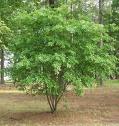Quercus Nigra Tree Information
Images of Quercus Nigra:






Quercus Nigra grows in the following 15 states and provinces:
Alabama, Arkansas, Florida, Georgia, Louisiana, Maryland, Mississippi, Missouri, New Jersey, North Carolina, Oklahoma, South Carolina, Tennessee, Texas, VirginiaInformation about Quercus Nigra:
The Quercus Nigra is commonly known as the Duck Oak, Orange Oak, Pin Oak, Possum Oak, Punk Oak, Spotted Oak, Striped Oak as well as Water Oak.
The currently accepted scientific name of water oak is Quercus nigra L. . It has been placed within the subgenus Erythrobalanus or black oak group. There are no recognized varieties, subspecies, or forms. Water oak hybridizes with the following species : x Q. falcata (southern red oak) = Q. X garlandensis Palmer x Q. incana (bluejack oak) = Q. X caduca Trel. x Q. laevis (turkey oak) = Q. X walteriana Ashe x Q. marilandica (blackjack oak) = Q. X sterilis Trel. x Q. phellos (willow oak) = Q. X capesii W. Wolf x Q. shumardii (Shumard oak) = Q. X neopalmeri Sudw. x Q. velutina (black oak) = Q. X demarei Ashe Water oak occurs on the Southeastern Coastal Plain from southern New Jersey and Delaware to southern Florida and west to eastern Texas. It occurs north along the Mississippi Valley to southeastern Oklahoma, Arkansas, Missouri, and southwestern Tennessee .Water oak occurs primarily in bottomland forests. The following published classifications list water oak as a dominant species: The natural communities of South Carolina Forest vegetation of the lower Alabama Piedmont Eastern deciduous forest Forest associations in the uplands of the lower Gulf Coastal Plain Some of the information provided here is attributed to:Carey, Jennifer H. 1992. Quercus nigra. In: Fire Effects Information System, [Online]. U.S. Department of Agriculture, Forest Service, Rocky Mountain Research Station, Fire Sciences Laboratory (Producer). , available at the USDA Fire Effects Information System (FEIS) website